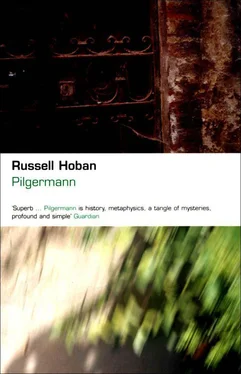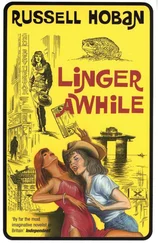Russell Hoban - Pilgermann
Здесь есть возможность читать онлайн «Russell Hoban - Pilgermann» весь текст электронной книги совершенно бесплатно (целиком полную версию без сокращений). В некоторых случаях можно слушать аудио, скачать через торрент в формате fb2 и присутствует краткое содержание. Год выпуска: 2002, Издательство: Bloomsbury Publishing PLC, Жанр: Современная проза, на английском языке. Описание произведения, (предисловие) а так же отзывы посетителей доступны на портале библиотеки ЛибКат.
- Название:Pilgermann
- Автор:
- Издательство:Bloomsbury Publishing PLC
- Жанр:
- Год:2002
- ISBN:нет данных
- Рейтинг книги:5 / 5. Голосов: 1
-
Избранное:Добавить в избранное
- Отзывы:
-
Ваша оценка:
- 100
- 1
- 2
- 3
- 4
- 5
Pilgermann: краткое содержание, описание и аннотация
Предлагаем к чтению аннотацию, описание, краткое содержание или предисловие (зависит от того, что написал сам автор книги «Pilgermann»). Если вы не нашли необходимую информацию о книге — напишите в комментариях, мы постараемся отыскать её.
Pilgermann — читать онлайн бесплатно полную книгу (весь текст) целиком
Ниже представлен текст книги, разбитый по страницам. Система сохранения места последней прочитанной страницы, позволяет с удобством читать онлайн бесплатно книгу «Pilgermann», без необходимости каждый раз заново искать на чём Вы остановились. Поставьте закладку, и сможете в любой момент перейти на страницу, на которой закончили чтение.
Интервал:
Закладка:
Jesus does not tell us everything but he has much to show us. In the next scene of the Naumburg stone story we see Peter on the left-hand slant of the roof of the porch of the rood-screen doorway. He is turning away from the high priest’s maidservant who questions him; he is making one of the three denials he will make before the cock crows. Ah! the genius of that Naumburg stone, that Naumburg master! Look at the face of that maidservant, the eternal directness of the soul behind the stone eyes that are turned away from Peter as she looks towards what is not carved in the stone, towards Jesus brought before the high priest, chief priests, elders and scribes. She looks away from Peter but she stretches out her left hand, it is almost touching Peter’s shoulder as she says, ‘And thou with the Nazarene wast — Jesus.’ Peter says, ‘Neither I know nor understand what thou sayest.’ What is meant by this triple denial of Christ? Is not each part of the Holy Trinity being denied once in it? As if Christ is telling us: ‘Look at this mortal lump, this thrice-denier; yet will he be my rock.’ Because mortal lumps are all humanity can offer, and if rocks are needed these must suffice. Having only mortal lumps to choose from, Christ will use this one for a betrayer, that one for a rock. Just as his father before him used this one to receive the tablets of the Law, that one to make a golden calf. Matter and anti-matter, yes and no of the treadmill that walks the rolling earth from night to day. Here stands in the stone Peter the rock in baffled recognition of what he is and what he is not in the numbers of eden and gehinnom. That the stone and the carver could produce these two faces, the maidservant and Peter, that is certainly in the eden side of the balance for all of us. Such a brutal innocence, that maidservant! An innocence not possible for Jesus, the innocence of the pure lump of mortality with no connexions in high places. And Peter! that face of his! The light of understanding that floods the stone of him!
Peter and the maidservant are on one side of the roof of the porch of the rood-screen doorway; on the other side are two soldiers of the watch. Underneath them in the rood-screen doorway and twice as large as they is Christ crucified, Mary on one side of him and John on the other.
After the maidservant and Peter and the soldiers of the watch here is Jesus before Pilate. Oh! that meekness of Jesus, that stone meekness. It is the meekness of plutonium. He is so very docile, like some absent-minded celebrity asked to pose in a group photograph. ‘Here? Is this all right, is this where you want me to stand?’ Waiting patiently for the time when he will explode himself upon the world. Pilate holds out his left hand while a servant pours water over it into a basin. Pilate is thunderstruck and so is the servant; to both of them at once has come the realization that this moment is what it is for ever — it has never been before, it will never be again; it is Now and they are living it, never in life, never in death to escape from it. Pilate’s mouth is open wide, it is as if a great thick invisible vine is growing out of it; or a snake. ‘Innocent I am from the blood of this man,’ he says; ‘ye will see to it.’ Of the two faces that of the servant shows the deeper feeling; Pilate’s perception of this moment is confused by his official identity but the servant can take it in just as it is and he knows that never in the history of the human race will there be any going back from this moment. Here is the hump of the story, here is the last of the uphill part; after this it rolls like a monstrous and implacable wheel through the ages, crushing everything in its path and preparing the way of the Lord, the gone, the never-again-coming.
Christ is scourged then, and in the next and last scene of the rood-loft reliefs he goes off dragging his cross. These last two scenes, like the Crucifixion below, are not from the hand of the master who carved the first five scenes; it was the destiny of the original stone of the last two scenes not to endure with those other faces and gestures that are fixed for us upon the mirror of time. These last two scenes and the Crucifixion, all of them in wood and by a centuries-later hand, have not the power of the original stone. As I have said, Christ has a special way of being with stone and the Naumburg master knew how to let that special way of being happen.
I am on the road, this road through time and space to Jerusalem, but I am no longer alone: the sow I killed and her peasant master now walk with me; they are my new colleagues, and not only they: the bear who was slain by his worshipper also walks with me; Udo the relic-gatherer whom I killed in the wood is here, and the tax-collector. Yes, the tax-collector — how not?
The sow is walking upright, she minces on her trotters like a heavy woman in tiny shoes, her flesh shaking and wobbling erotically, her flesh that is naked among us; there is a scarlet necklace of beaded drops round her throat and a thin trickle of blood from her mouth. She is confused by her present condition and shakes her head as she walks. ‘Little love!’ she says to her peasant master. ‘O my treasure!’ she says, pressing close to him, ‘What gives it here?’
‘He killed you, this one,’ says the peasant. ‘Smell him. Is he a Jew?’
‘I don’t know,’ she says. ‘I don’t think I can tell the difference any more.’ She turns to me. ‘Ay!’ she says, ‘how the life rushed out of me on to your blade, it was like an orgasm. Such a knifeman are you, such a thruster!’
‘Such a sow are you,’ I say. ‘Such a Jew-finder, such a leaver-behind of dead bodies.’
‘How sweet she is!’ This is Bruder Pförtner, he too is with us. ‘How I love her!’ He throws himself upon the dead sow, forcing her down on all fours and entering her zestfully.
‘Ah!’ cries the sow to Pförtner, ‘you were always the best, you were always the most man of them all!’
‘Get off her,’ says the peasant to Pförtner. ‘She’s mine.’
‘There’s enough of her for everybody,’ says Pförtner contentedly. ‘She’s inexhaustible. You must be patient and wait your turn.’ He reaches orgasm quickly, screams with joy as the sow squeals under him, then falls off her and lies snoring in the road behind us as we go on.
‘Tell me about yourself,’ I say to the sow. ‘Tell me your story.’
‘Ah!’ she says. ‘There’s so much to tell! There’s more to tell than even I myself know. You know of course that I’m descended from the Moon Goddess, from Diana herself; yes, everyone knows that. That’s why, you see, I’m so eternally desirable — I have that quality of virginity. Every time a man takes me it feels to him as if it’s my very first time; it makes him feel so outrageous, so naughty, so triumphantly and impeccably male. Why don’t you have me, you’ll see what I mean.’
‘Not just now,’ I said. ‘I want to hear more about you.’ Wondering at the same time whether a penis and testicles might have such a thing as a ghost, and whether a live eunuch might couple with a dead sow by means of the ghost of a penis. Never in my life had there been so many sexual invitations as now when I was castrated.
‘My sowhood,’ said the sow, ‘has not been like that of other sows. I am fecund, I am fertile, but I have never farrowed. I have not multiplied, have not increased myself; my essential virtue is intact, I have not gone beyond the original limits of myself. Only men have known me, I have never felt upon me the rough and bristly weight of a boar.’
‘How was that?’ I said, remembering suddenly that it was probably she who had eaten the lost parts of me. There she was mincing beside me on her little trotters, looking at me sidelong from under her blonde eyelashes. The trickle of blood from her mouth and the red line round her throat made her seem a creature enslaved by lust.
Читать дальшеИнтервал:
Закладка:
Похожие книги на «Pilgermann»
Представляем Вашему вниманию похожие книги на «Pilgermann» списком для выбора. Мы отобрали схожую по названию и смыслу литературу в надежде предоставить читателям больше вариантов отыскать новые, интересные, ещё непрочитанные произведения.
Обсуждение, отзывы о книге «Pilgermann» и просто собственные мнения читателей. Оставьте ваши комментарии, напишите, что Вы думаете о произведении, его смысле или главных героях. Укажите что конкретно понравилось, а что нет, и почему Вы так считаете.












